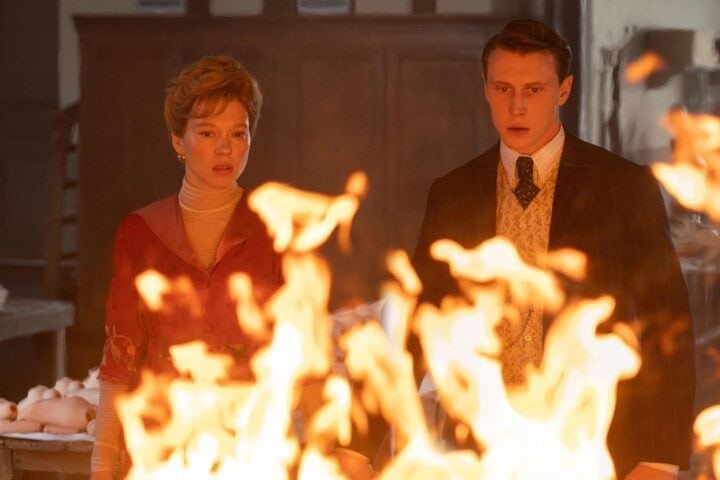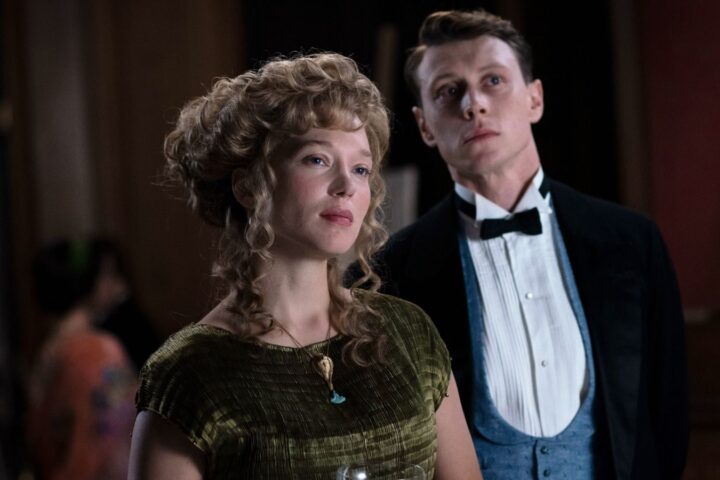The premise of Sam H. Freeman and Ng Choon Ping’s Femme is as provocative as it is unusual in the landscape of LGBTQ cinema, which typically favors depictions of trans people on a journey from one gender to the other rather than moving back and forth between gender presentations. With Femme, an extrapolation of their 2021 short of the same name, Freeman and Ping imagine a world where trans-ness isn’t necessarily an identity so much as a recurrent strategy for enjoyment, a gaming device, even a weapon.
Jules (Nathan Stewart-Jarrett) comes into their own as Aphrodite Banks when they perform on stage. But they also have zero qualms about taking their feminine embodiment out of the safe zone of a London queer club and into the local convenience store to buy cigarettes. That’s when Preston (George MacKay), the same straight-presenting, tatted-up guy who previously checked out Aphrodite when he was by himself, decides to shame them in front of his buddies for daring to take up space as a trans person. When Aphrodite reacts, Preston physically assaults her.
The attack makes Aphrodite retreat into being just Jules full time and courting the just-as-nasty and self-obsessed gaze of men at a sauna, where, it turns out that Preston also hangs out. Only Jules recognizes Preston in this moment, which grants them (or is it Aphrodite passing as Jules?) a trans sort of superpower, where she can recognize those—say, straight-identifying lovers—who under certain conditions wouldn’t be able to tell her apart from the next bloke.
Preston and Jules end up hooking up and what follows is a push-and-pull game where the volatile Preston keeps using Jules for sex and then throwing them away, knowing that this is what will drive them to come back. But not without almost getting caught having sex by his homophobic mates. Simultaneously, Jules gets all sorts of pleasure from the risk of being found in bed with Preston mid-act, or found by Preston to have been Aphrodite all along.
Femme fascinatingly taps into the radical possibilities of the sartorial as narrative device, exploring the tabooed nuances of queer subjectivity and muddying the lines between gay and trans in the way that lived experience tends to do. The film also sees in the Jules/Aphrodite dichotomy a toggling, familiar to many queer people, between a miserable life in a gay world hungry for the most toxic forms of masculinity (or its aesthetics anyway) and the miserable dynamics of trans life in a cis world that demands complete and permanent passability or death.
“She was the real me and I was the performance,” Jules says at one point. But, in reality, everyone is performing. If not on stage, then in the street, in one’s home or for the camera—from Jules’s habit of jacking off to porn featuring the type of guy that Preston represents to Jules’s plotting to video their sexual encounter as if to provoke Preston’s wrath.
Femme also poses several questions about the slipperiness of identity, and desire’s tendency to veer toward risk, if not brutality. The figure of the transphobic bully is exposed as a pathetically clichéd closet case who makes up for his own queerness by playing up masculine codes. Preston also embodies this paranoid figure’s propensity to direct the virulence of misogyny traditionally reserved to cisgender women to yet another “femme” target—as if to consummate and disavow his desire at the same time, covering up erotic yearning with the longing to destroy.
This could all have amounted to a lovely love story. And, at times, Femme does seem to be leaning into the alchemy of an unexpected romance, especially when Preston, after sleeping over Jules’s home, wakes up and wanders around the house. In this moment, you may wonder if he will find photographs of Jules as Aphrodite, connect the dots, and, surprising his own self, allow something other than objectification to emerge for once from his rageful being.
Instead, the film retreats into thriller terrain in its final act, at which point the fantasy of there ever being a more tender way for femme gays and the straight-presenting men who desire them to relate breaks down. And all we have left is violence and counter-violence. By the time the bully hits the bullied, the bully’s own psychic life has been destroyed. And by the time the bullied stages revenge, it all seems so futile. In this moment, Aphrodite is already stuck in a web inside which the bully functions as the greatest, if not the only, true possibility of enjoyment.
Since 2001, we've brought you uncompromising, candid takes on the world of film, music, television, video games, theater, and more. Independently owned and operated publications like Slant have been hit hard in recent years, but we’re committed to keeping our content free and accessible—meaning no paywalls or fees.
If you like what we do, please consider subscribing to our Patreon or making a donation.





